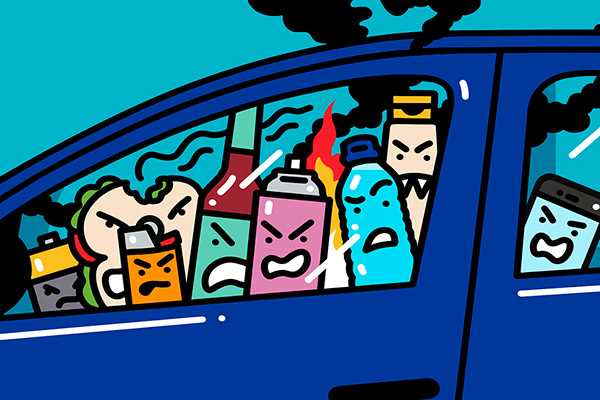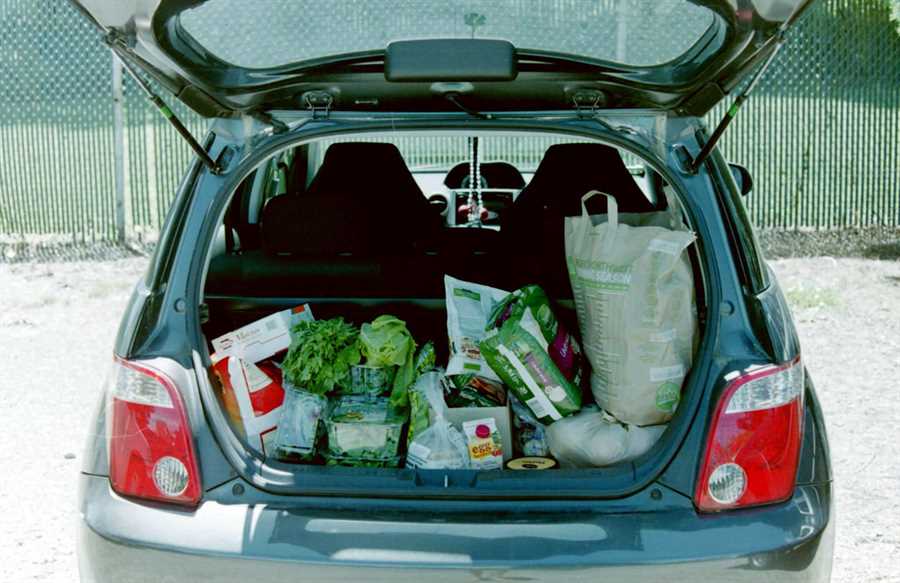







Leaving cooked food in a hot car can have serious consequences for its safety and taste. It is important to understand that cooking food does not make it immune to bacteria and other pathogens. In fact, cooked food can provide an ideal breeding ground for these microorganisms if it is not handled and stored properly.
When food is left in a hot car, the high temperatures can create an environment that promotes the growth of bacteria and can lead to foodborne illnesses. Bacteria can multiply rapidly at temperatures between 40°F (4°C) and 140°F (60°C), which is known as the “danger zone”. This means that leaving cooked food in a hot car, where temperatures can easily exceed this range, can put you at risk of consuming contaminated food.
Cooked food left in a hot car can also have its taste and texture compromised. The heat can cause the food to spoil more quickly, leading to a change in flavor and texture. This can be especially true for perishable foods such as meat, seafood, dairy products, and cooked leftovers. When these foods are exposed to high temperatures for an extended period of time, they can become dry, tough, and develop an unpleasant odor.
In summary, it is not safe to leave cooked food in a hot car. The high temperatures can promote the growth of bacteria, leading to foodborne illnesses. Additionally, the heat can alter the taste and texture of the food, making it less enjoyable to eat. It is always best to handle and store cooked food properly to ensure its safety and quality.
Is it safe to keep cooked food in a hot car?
Leaving cooked food in a hot car is generally not safe and can pose serious health risks. The combination of heat and a confined space can create an ideal environment for bacteria to multiply and spoil the food, leading to foodborne illnesses.
Cooked food should be stored properly to maintain its freshness and prevent bacterial growth. Ideally, it should be refrigerated or consumed within two hours of cooking, especially if the temperature exceeds 90°F (32°C).
Why is it unsafe?
High temperatures can cause the growth of harmful bacteria, such as Salmonella and Staphylococcus, which can cause food poisoning when consumed. These bacteria thrive in temperatures between 40°F (4°C) and 140°F (60°C), commonly known as the “danger zone.”
Leaving cooked food in a hot car can result in a rapid increase in temperature, especially on hot summer days. Even if the food initially feels warm or hot to touch, it may cool down too slowly, allowing bacteria to multiply rapidly. Consequently, consuming such food can lead to foodborne illnesses, including vomiting, diarrhea, and stomach cramps.
How to safely transport cooked food?
If you need to transport cooked food in a car, it is essential to take necessary precautions:
- Use insulated containers or coolers with ice packs to keep the food at a safe temperature.
- Ensure the food is properly wrapped or sealed to prevent contamination.
- Minimize the time the food spends outside of temperature-controlled environments.
By following these guidelines, you can help minimize the risk of foodborne illnesses and ensure the safety of your cooked food.
Potential risks

Leaving cooked food in a hot car can pose several potential risks. Here are some of them:
1. Bacterial growth
When food is left in a hot car, especially in temperatures above 40°C (104°F), it creates an ideal environment for bacterial growth. Bacteria multiply rapidly in warm conditions and can cause food poisoning if consumed.
2. Food spoilage
Heat can cause food to spoil more quickly. The high temperatures in a car can accelerate the breakdown of proteins and fats in the food, leading to changes in texture, taste, and smell. This can make the food less appealing and potentially unsafe to consume.
3. Increased risk of foodborne illnesses
Leaving cooked food in a hot car increases the risk of foodborne illnesses. If the food is not stored at the correct temperature (below 4°C/40°F) or heated to a sufficient temperature to kill bacteria, it can become contaminated and cause illnesses such as salmonella or E. coli infection.
It’s worth noting that some types of food, such as dairy products, meat, poultry, and seafood, are more prone to spoilage and bacterial contamination. It’s important to be particularly cautious with these types of food when considering leaving them in a hot car.
4. Loss of nutritional value
Heat can also degrade the nutritional value of food. Vitamins, especially vitamin C and certain B vitamins, are sensitive to heat and can be partially or completely destroyed when exposed to high temperatures. This can diminish the nutritional benefits of the food.
In conclusion, leaving cooked food in a hot car can result in bacterial growth, food spoilage, increased risk of foodborne illnesses, and loss of nutritional value. It’s advisable to avoid leaving perishable food items in a hot car, especially for extended periods.
Food safety guidelines
When it comes to food safety, it’s important to follow certain guidelines to ensure that what you eat is safe and free from harmful bacteria. Here are a few key tips to keep in mind:
Proper storage and temperature control
Storing food at the right temperature is crucial in preventing the growth of harmful bacteria. Perishable foods, such as meat, poultry, dairy products, and cooked foods, should be kept at or below 4°C (39°F) in your refrigerator to slow down bacterial growth.
When taking food on the go, it’s important to keep hot foods hot and cold foods cold to prevent bacterial growth. If you’re transporting cooked food during hot weather, it’s best to keep it in an insulated cooler with ice or ice packs to maintain a safe temperature.
Cross-contamination prevention
Cross-contamination can occur when bacteria from one food item is transferred to another, potentially contaminating it. To prevent cross-contamination, always keep raw and cooked foods separate. Use separate chopping boards and utensils for raw and cooked foods, and wash them thoroughly with hot, soapy water in between use.
In addition, it’s important to wash your hands thoroughly before and after handling food, especially when switching between raw and cooked items. This helps to minimize the risk of transferring bacteria from your hands to the food.
Proper cooking temperatures
Cooking food at the right temperature is essential in killing any harmful bacteria that may be present in the food. Use a food thermometer to ensure that foods are cooked to their proper internal temperatures.
Here are some general guidelines for safe cooking temperatures:
- Poultry (including chicken and turkey): 74°C (165°F)
- Ground meat (including beef and pork): 71°C (160°F)
- Seafood and fish: 63°C (145°F)
- Leftovers and casseroles: 74°C (165°F)
By following these food safety guidelines, you can help protect yourself and others from foodborne illnesses and enjoy your meals with peace of mind.
How heat affects cooked food
Exposing cooked food to high temperatures can have various effects on its quality and safety. Here are some ways heat can impact cooked food:
1. Drying out

Heat can cause moisture to evaporate from cooked food, leading to dryness. This can result in a loss of texture and flavor, making the food less enjoyable to eat.
2. Bacterial growth
When cooked food is left in a hot environment, such as a car, it creates an ideal breeding ground for bacteria to multiply. Bacteria can double their numbers every 20 minutes at temperatures between 40°F (4°C) and 140°F (60°C), commonly known as the “danger zone”. This increases the risk of foodborne illnesses.
It’s important to note that the longer cooked food stays in the danger zone, the more bacteria can grow, and the higher the risk becomes.
Certain bacteria, such as Bacillus cereus, are known to produce toxins at high temperatures, which can cause food poisoning if consumed. Additionally, bacteria like Staphylococcus aureus can survive high temperatures and produce heat-resistant toxins that can cause illness.
It’s crucial to handle and store cooked food properly to prevent bacterial growth and ensure food safety. This includes promptly refrigerating or consuming cooked food to minimize the time it spends in the danger zone.
Common misconceptions
There are several common misconceptions about leaving cooked food in a hot car, but it’s important to separate fact from fiction. Here are some of the most common misunderstandings:
1. It’s safe to leave hot food in a hot car
Contrary to popular belief, leaving cooked food in a hot car can be dangerous. The high temperatures in a closed car can create an ideal environment for bacteria growth, which can lead to foodborne illnesses. It is always best to store cooked food properly in a cool place or refrigerate it promptly.
2. The food will stay fresh and edible
Another misconception is that the food will remain fresh and edible if left in a hot car. However, the heat can cause the food to spoil more quickly, leading to changes in taste, texture, and quality. It’s important to consume perishable food items within the recommended time frame to avoid any potential health risks.
3. It’s okay to reheat and consume the food later
Some people believe that reheating the cooked food after it has been left in a hot car will make it safe to eat. However, reheating will not eliminate any toxins or bacteria present in the food. Once food has been exposed to high temperatures, it is best to discard it to ensure your safety.
4. It only applies to certain types of food
Many individuals think that leaving certain types of food in a hot car is safe, while others should be avoided. However, all types of cooked food can pose a risk when left in a hot car. Whether it’s meat, fish, vegetables, or dairy products, it’s crucial to handle and store food properly to prevent any foodborne illnesses.
It’s important to remember that leaving cooked food in a hot car can have serious health consequences. Always follow proper food storage guidelines to ensure your safety and the safety of others.
Questions and answers
How long can you leave cooked food in a hot car?
It is recommended not to leave cooked food in a hot car for more than 2 hours. The heat inside a car can cause bacterial growth in the food, leading to foodborne illnesses.
What temperature is too hot for leaving cooked food in a car?
Any temperature above 40 degrees Celsius (104 degrees Fahrenheit) is considered too hot for leaving cooked food in a car. At these temperatures, bacteria can multiply rapidly, putting you at risk of food poisoning.
What are the dangers of leaving cooked food in a hot car?
Leaving cooked food in a hot car can lead to bacterial growth, which can cause foodborne illnesses such as salmonella or E. coli. These illnesses can result in symptoms like diarrhea, vomiting, and fever. It is important to store cooked food properly to ensure food safety.
Can leaving cooked food in a hot car cause any health problems?
Yes, leaving cooked food in a hot car can increase the risk of foodborne illnesses. Bacterial growth can occur rapidly in high temperatures, leading to the development of harmful bacteria. Consuming such contaminated food can result in various health problems, including digestive issues, diarrhea, and abdominal pain.






